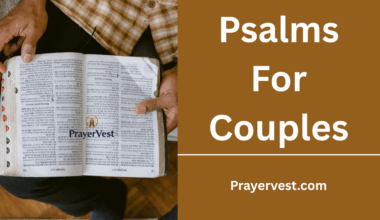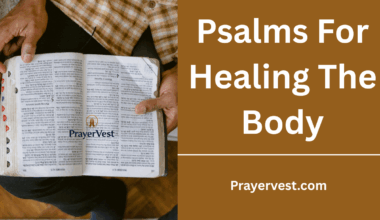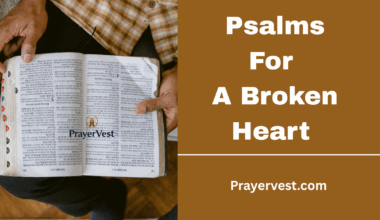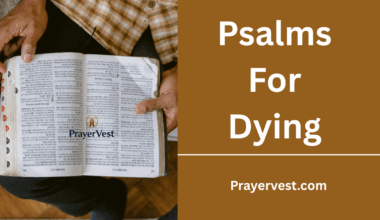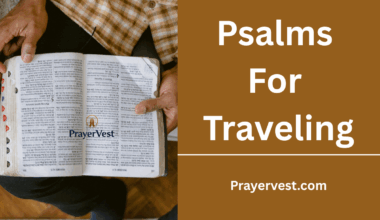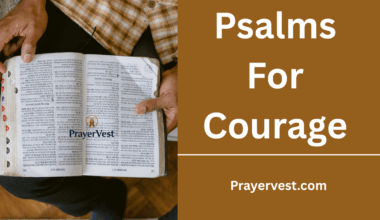Psalms For Deliverance From Death. Our souls naturally seek help when life seems to be coming to an end, whether it be physically, emotionally, or spiritually. In times like these, the book of Psalms provides powerful words of hope because of its unadulterated emotion and ardent faith.
They are more than just old melodies; they are the living prayers of those who experienced the valley of the shadow of death and came out on the other side with a greater appreciation for God’s ability to save. The Psalms offer a holy vocabulary to express both fear and faith for people who are facing disease, danger, despair, or situations that are close to death.
We come across pleas for assistance from people on the verge of disaster throughout the book of Psalms. David frequently prayed to the Lord for protection and sanctuary when he was being hunted down by adversaries and devastated by sorrow.
Other psalmists express their agony and anguish, asking God to keep them alive, give them new strength, or raise them out of the abyss. These prayers are honest, fervent, and intensely personal; they are neither pretentious nor religious. However, there is an underlying certainty in every prayer: God hears, God provides, and God protects.
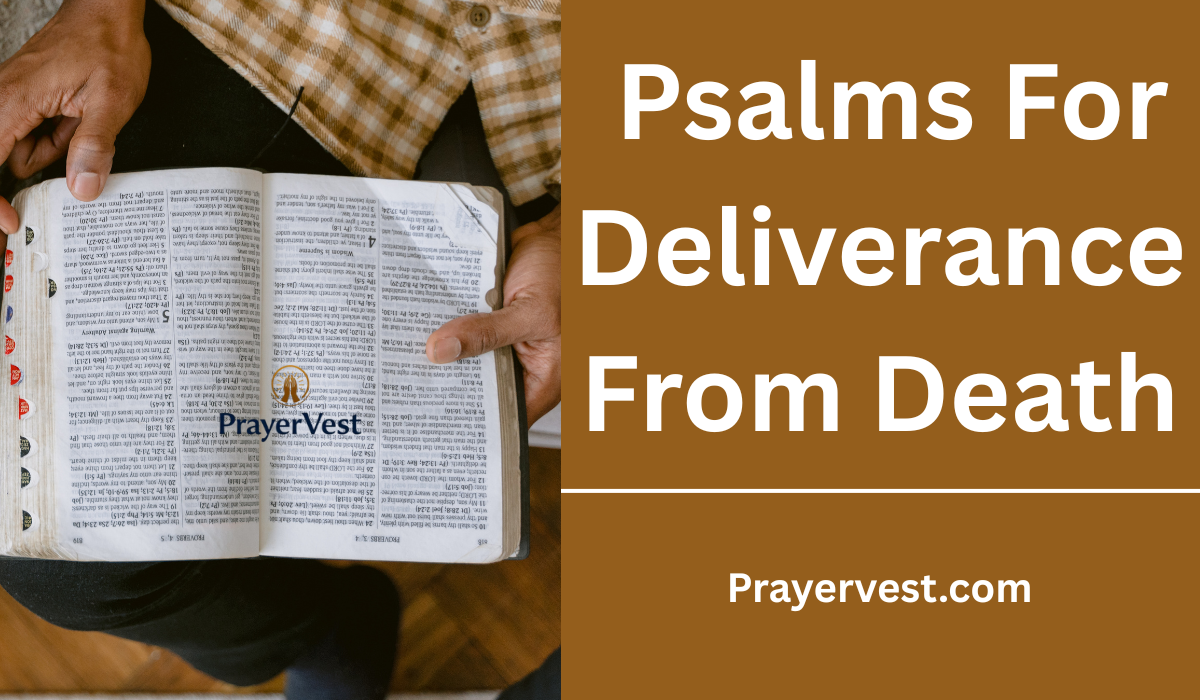

Deliverance from death is not only a physical escape; it can also be the soul’s resurrection, the release of hope after a significant loss, or the breaking of despair’s hold. These Psalms provide comfort to individuals, families, or couples going through a difficult time by reaffirming that death does not have the last say. In addition to being the creator of life, God also saves us from destruction. May these verses serve as a reminder to you that God’s kindness is ever-present and His power to save remains unwavering, even in the face of death.
50 Powerful Psalms For Deliverance From Death (2026)
1. Psalm 18:4-5
“The cords of death entangled me; the torrents of destruction overwhelmed me. The cords of the grave coiled around me; the snares of death confronted me.”
David poetically describes the intense danger and despair that surrounded him. These vivid metaphors evoke the feeling of being helplessly trapped by death’s grip. Yet, the very next verses show that God heard his cry and delivered him. This passage reminds us that even when death looms near, God is attentive to our pleas and powerful enough to rescue us from destruction.
Reflection
When life brings us face-to-face with mortality—through illness, violence, or overwhelming fear—we often feel paralyzed and abandoned. But the Psalms assure us that God is present even in our most desperate moments. David’s words reflect our human terror, yet they also hint at the hope that cries to heaven do not go unheard. God responds to the voice of the brokenhearted. When the snares of death seem unshakable, we can hold to this truth: divine rescue may not always look the way we expect, but it always flows from God’s unwavering love.
2. Psalm 30:3
“You, Lord, brought me up from the realm of the dead; you spared me from going down to the pit.”
This verse is a testimony of divine intervention. David had faced life-threatening illness or danger, yet he celebrates God’s saving power. The “pit” often symbolizes death or deep despair in Hebrew poetry, and being lifted from it represents restoration, renewal, and a second chance at life.
Reflection
There are times when we feel beyond recovery, whether physically, emotionally, or spiritually. But the same God who rescued David still delivers today. He lifts us from our graves—both literal and metaphorical. Whether it’s healing from a fatal diagnosis, release from suicidal thoughts, or redemption from a life of sin, God specializes in resurrection power. His mercy finds us in the pit and restores us to praise. This verse invites us to remember every moment we’ve been spared, not as chance, but as divine grace.
3. Psalm 116:8-9
“For you, Lord, have delivered me from death, my eyes from tears, my feet from stumbling, that I may walk before the Lord in the land of the living.”
This psalm celebrates personal salvation from a life-threatening situation. The psalmist acknowledges that God not only saved his life but also restored his ability to rejoice and move forward. Deliverance isn’t just about escaping death—it’s about being empowered to live in faithfulness and gratitude.
Reflection
True deliverance changes us. It transforms how we see life, how we walk through it, and how we relate to God. Every rescue is an invitation to deeper worship. When God wipes away our tears and steadies our trembling steps, we are not merely preserved—we are commissioned. This verse is a call to live with purpose in the land of the living, remembering that each breath is a gift to be spent in God’s presence. Let every deliverance become a song of thanksgiving.
4. Psalm 107:19-20
“Then they cried to the Lord in their trouble, and he saved them from their distress. He sent out his word and healed them; he rescued them from the grave.”
This verse emphasizes the power of prayer and God’s faithful response. Amid life-threatening peril, the people cried out, and God’s word became their healing and deliverance. His rescue came not through armies or physicians but through divine intervention rooted in His mercy.
Reflection
Desperation often leads to clarity. When we are stripped of all earthly options, we discover the power of crying out to God. Psalm 107 shows us that even when trouble is self-inflicted or due to rebellion, God’s grace remains available. He speaks life where death reigns. When we cry out, His Word becomes both balm and barrier—healing our wounds and halting our descent into destruction. God doesn’t just rescue us; He restores us to wholeness.
5. Psalm 56:13
“For you have delivered me from death and my feet from stumbling, that I may walk before God in the light of life.”
David acknowledges that his survival wasn’t just about escape—it was about purpose. Being delivered from death gave him a chance to live differently: to walk before God, in His light. This verse reveals that salvation leads to transformation, not just relief.
Reflection
We often pray for deliverance as a way of avoiding pain. But biblical deliverance is much deeper—it’s about being redirected into the presence and purposes of God. David reminds us that every time God saves us, He also reorients our steps. The light of life isn’t merely the absence of death; it’s the fullness of walking with God. Deliverance should lead us to deeper devotion. Our rescued lives should become living testimonies of God’s faithfulness.
6. Psalm 49:15
“But God will redeem me from the realm of the dead; he will surely take me to himself.”
This verse is a declaration of trust in God’s eternal power. While others trust in wealth or status, the psalmist confidently proclaims that God alone has power over the grave. His faith isn’t just in temporary deliverance, but in ultimate redemption.
Reflection
Death has always been humanity’s greatest fear, yet the psalmist lifts his eyes beyond the grave. He trusts in a God who not only delivers from present danger but also offers eternal life. This is a reminder that the ultimate deliverance isn’t merely surviving today but being united with God forever. Our hope must extend beyond this world. Even when we face death, we can live with confidence knowing that God’s redemption reaches beyond the final breath.
7. Psalm 91:14-16
“‘Because he loves me,’ says the Lord, ‘I will rescue him; I will protect him, for he acknowledges my name… With long life I will satisfy him and show him my salvation.’”
These verses contain God’s direct promise to those who love Him. His deliverance is both personal and powerful. Protection, satisfaction, and salvation are the inheritance of those who cling to Him.
Reflection
God’s promises are rooted in relationship. When we love Him, trust Him, and call on His name, He becomes our refuge in life and in death. Deliverance is more than survival—it’s being enfolded in God’s covenant love. He rescues not because we are perfect, but because we belong to Him. Let this passage embolden our prayers and quiet our fears: the God who loves us will not abandon us to death, but will satisfy us with life everlasting.
8. Psalm 118:17
“I will not die but live, and will proclaim what the Lord has done.”
This declaration of life comes from someone who faced near-death experiences. Rather than succumbing to despair, the psalmist affirms God’s power to deliver and uses his extended life to bear witness to God’s works.
Reflection
There are moments when we must speak life over ourselves, even when death feels near. The psalmist models this bold faith, declaring life with the purpose of praise. Our survival is not pointless; it is charged with divine intention. Every extra day is an opportunity to proclaim God’s goodness. So, whether you’re facing a physical illness, emotional darkness, or spiritual despair, declare this truth over your life: “I will live, and I will testify.”
9. Psalm 3:5
“I lie down and sleep; I wake again, because the Lord sustains me.”
David wrote this psalm while fleeing from his son Absalom, in a time of betrayal and danger. Yet, even while surrounded by threats, he found peace in God’s sustaining power. Waking up after lying down was no small thing—it was evidence of divine preservation.
Reflection
Many people live with anxiety that robs them of rest, especially when facing situations of life or death. But David’s example reminds us that true safety doesn’t come from circumstances but from God. Each new morning is a divine mercy. To lie down in danger and rise again in peace is a subtle yet profound form of deliverance. Even if our enemies surround us, we are never beyond the reach of God’s sustaining grace. Trusting Him allows us to rest, even in crisis.
10. Psalm 34:19-20
“The righteous person may have many troubles, but the Lord delivers him from them all; he protects all his bones, not one of them will be broken.”
This verse emphasizes that trouble is not foreign to the righteous, but deliverance is always available. The promise is not a trouble-free life, but the Lord’s consistent intervention and protection, even in physical danger.
Reflection
God does not promise immunity from suffering, but He does promise deliverance through it. These words offer reassurance to those who feel crushed by their burdens or cornered by death itself. We may be afflicted, but we are not abandoned. God is intimately involved in our pain and committed to preserving what matters most. Sometimes His deliverance comes through healing, sometimes through endurance, but always through His love.
11. Psalm 6:4-5
“Turn, Lord, and deliver me; save me because of your unfailing love. Among the dead no one proclaims your name. Who praises you from the grave?”
David cries out from a place of deep anguish, pleading for God’s rescue. His prayer is urgent, personal, and rooted in God’s covenant love. He appeals not just for survival, but so he can continue worshiping the Lord.
Reflection
In moments of crisis, this psalm gives us words for our desperation. It invites us to cry for help, not based on our merit, but God’s mercy. David’s reasoning is simple yet profound: life is for praise. He pleads for deliverance so that his voice can continue to glorify God. Let this shape our prayers—not just to be spared from death, but to live lives filled with worship.
12. Psalm 23:4
“Even though I walk through the valley of the shadow of death, I will fear no evil, for you are with me; your rod and your staff, they comfort me.”
This beloved verse speaks of God’s presence in the darkest, most dangerous moments of life. The “valley of the shadow of death” is not avoided—it is walked through. And yet, there is no fear, because God is near.
Reflection
Sometimes God doesn’t lead us around the valley—He walks us through it. And the difference between despair and hope in that valley is His presence. Deliverance doesn’t always mean escape; it can mean enduring without fear. His rod corrects, and His staff protects. When death casts its shadow over our path, we can hold fast to the Shepherd who walks beside us, lighting our way with His love.
13. Psalm 41:2-3
“The Lord protects and preserves them—they are counted among the blessed in the land—he does not give them over to the desire of their foes. The Lord sustains them on their sickbed and restores them from their bed of illness.”
These verses reveal God’s compassion toward the weak and ill. Deliverance here is both protective and restorative, showing that God not only prevents destruction but also brings healing.
Reflection
When our bodies fail and we are confined to a sickbed, God remains faithful. His deliverance reaches into the quiet, painful corners of suffering. This psalm gives hope to the sick—that God sees, sustains, and restores. We are not forgotten in our affliction. The same God who defends us from enemies is the one who cares tenderly for us in sickness. His healing may come gradually, suddenly, or even eternally—but it always springs from His love.
14. Psalm 9:13-14
“Lord, see how my enemies persecute me! Have mercy and lift me up from the gates of death, that I may declare your praises in the gates of Daughter Zion, and there rejoice in your salvation.”
Here, the psalmist pleads for rescue so that he may continue to praise and rejoice in God. Deliverance is not just survival—it is an opportunity to testify publicly to God’s saving power.
Reflection
When death feels close and enemies seem to triumph, our greatest weapon is prayer rooted in purpose. The psalmist doesn’t just want to live—he wants to live *for* something: the praise of God. This is a profound truth for us today. When we’re rescued from danger, it is not for self-preservation alone. It is so we may stand among God’s people and declare, with joy, that He is Savior and Sustainer.
15. Psalm 71:20
“Though you have made me see troubles, many and bitter, you will restore my life again; from the depths of the earth you will again bring me up.”
This verse holds the tension between past suffering and future hope. The psalmist acknowledges that God has allowed him to experience deep sorrow, but also confidently proclaims that God will restore him.
Reflection
Restoration is God’s specialty. Even when our lives have been shattered by deathly circumstances—be it illness, depression, or loss—He can raise us from the depths. This is resurrection hope, not just for the future, but for now. Our God can breathe new life into what seemed buried. He does not waste our sorrow. Each painful chapter becomes part of a bigger, redemptive story.
16. Psalm 144:10
“To the One who gives victory to kings, who delivers his servant David from the deadly sword.”
This short declaration recognizes that even mighty kings need deliverance. David attributes his survival and victories not to military strength but to God alone.
Reflection
No one is too strong or too favored to escape the need for divine rescue. Even kings, warriors, and leaders face the shadow of death. David shows us that deliverance is not earned by position—it is a gift from God. When we are threatened by forces beyond our control, we must look upward, not inward. Every victory over death is a testimony of God’s hand at work.
17. Psalm 86:13
“For great is your love toward me; you have delivered me from the depths, from the realm of the dead.”
This verse is a praise for past deliverance, rooted in the greatness of God’s love. The psalmist recognizes that his rescue was not because of merit, but because of God’s steadfast, covenantal love.
Reflection
When we reflect on moments we were spared from tragedy or lifted from despair, it’s not because we deserved it—it’s because of God’s love. His love reaches into the lowest places, into Sheol itself, and pulls us back. Remembering how God has delivered us should stir gratitude and deeper faith. It affirms that love—not luck—is what sustains our lives.
18. Psalm 31:14-15
“But I trust in you, Lord; I say, ‘You are my God.’ My times are in your hands; deliver me from the hands of my enemies, from those who pursue me.”
David entrusts his entire life—his future, his safety, his time—into God’s hands. Though enemies pursue him, he is confident that God holds ultimate authority over life and death.
Reflection
Faith means surrendering not just our fears but our very timeline into God’s care. “My times are in your hands” is a prayer of full release. When death draws near, whether by people, disease, or despair, we rest not in probability but in Providence. God’s hand is both sovereign and tender. To trust Him is to find peace, even as danger surrounds us.
19. Psalm 102:19-20
“The Lord looked down from his sanctuary on high, from heaven he viewed the earth, to hear the groans of the prisoners and release those condemned to death.”
These verses portray a God who sees, hears, and acts. He is not distant—He is attentive to the suffering of the condemned and determined to deliver them.
Reflection
God sees every tear and hears every groan, especially from those who are imprisoned by despair or sentenced to death, physically or spiritually. His justice is not cold; it is compassionate. These words offer comfort to the condemned, hope to the imprisoned, and assurance that God’s mercy reaches into the darkest cells. His heart beats for freedom and restoration.
20. Psalm 66:9
“He has preserved our lives and kept our feet from slipping.”
This verse is a praise for God’s sustaining power. It is a recognition that even when the path was slippery and life was threatened, God kept His people secure.
Reflection
Often, we don’t realize how many times God has preserved us until we look back. Not every deliverance is dramatic—some are quiet, daily acts of protection. Each breath, each step taken without harm, is evidence of divine care. This verse reminds us to give thanks not only for the crises God brought us out of, but also for the ones He prevented altogether. His faithfulness is often invisible, but always indispensable.
21. Psalm 103:4
“Who redeems your life from the pit and crowns you with love and compassion.”
This verse highlights God’s dual action: not only does He rescue us from destruction, but He also honors us with His enduring love. The “pit” represents death and despair, yet God lifts us out and replaces fear with dignity and favor.
Reflection
Deliverance is never just about escape—it’s also about elevation. When God pulls us from the edge of death, He doesn’t leave us barely surviving. He crowns us. This imagery is stunning: we are not only saved, but celebrated by a God whose love surrounds us. Whether you’ve been delivered from physical danger or spiritual ruin, know that your life is now wrapped in divine affection and compassion that restores your worth.
22. Psalm 33:19
“To deliver them from death and keep them alive in famine.”
This verse declares the power of God’s watchful eye over those who fear Him. His deliverance is both physical and provisional—He saves from death and sustains life even in times of scarcity.
Reflection
God’s deliverance often comes amid lack, not absence of trouble, but provision within it. When death threatens due to external conditions—whether famine, disaster, or disease—this verse reminds us that God intervenes. He is our rescuer and sustainer. In every season of drought, He provides what is needed to keep us alive—not just biologically, but spiritually and emotionally. His eyes are always on us, and His hand never withdraws.
23. Psalm 80:18
“Then we will not turn away from you; revive us, and we will call on your name.”
This plea is a request for revival following near ruin. It links deliverance with spiritual renewal—when God restores life, the natural response is renewed worship and dependence on Him.
Reflection
True deliverance rekindles our relationship with God. It’s not just about physical rescue but a spiritual awakening. This psalm expresses a longing not only to live but to live *for* God. Revival is deliverance that brings us back to the heart of worship. If you’ve felt near the brink of death—physically or in faith—cry out for this revival. God revives not just to prolong life, but to ignite deeper devotion.
24. Psalm 86:2
“Guard my life, for I am faithful to you; save your servant who trusts in you—you are my God.”
The psalmist appeals to God’s faithfulness based on relationship and trust. He doesn’t claim perfection, but acknowledges his identity as God’s servant and his dependence on divine protection.
Reflection
Sometimes deliverance flows from simply belonging to God. Our trust becomes the channel through which His power moves. In this prayer, the psalmist teaches us how to ask boldly: not because we are flawless, but because we are His. We can place our fragile lives in the hands of a faithful God, knowing that He is invested in our well-being as a loving Father is for His child.
25. Psalm 138:7
“Though I walk in the midst of trouble, you preserve my life. You stretch out your hand against the anger of my foes; with your right hand you save me.”
This verse acknowledges that danger may surround us, yet God’s hand is stronger than the threats we face. His intervention is direct and decisive.
Reflection
Trouble is often unavoidable, but destruction is not. God’s preserving hand is not passive—it pushes back against whatever seeks to destroy us. Whether it’s human enemies, spiritual forces, or emotional turmoil, the right hand of God intervenes. He is not distant in your crisis—He is active. When the storm closes in, remember whose hand holds you steady.
26. Psalm 118:18
“The Lord has chastened me severely, but he has not given me over to death.”
This verse speaks of divine discipline that does not lead to destruction. God corrects out of love, but even His hardest lessons stop short of abandoning us to death.
Reflection
Sometimes, what feels like death is discipline. God allows certain hardships to refine us, but never to destroy us. This psalm assures us that even when God allows pain, His boundary is clear: death does not get the final say. If you’ve been walking through hard lessons, take comfort in this truth: God’s chastening is temporary, but His grace is eternal. He preserves you through the process.
27. Psalm 4:8
“In peace I will lie down and sleep, for you alone, Lord, make me dwell in safety.”
This verse reflects the deep rest that comes from trusting God in the face of danger. Peace is possible not because there are no threats, but because God is our security.
Reflection
When we feel haunted by fear of death or danger, God offers peace that surpasses understanding. Sleep becomes sacred when we trust the One who neither slumbers nor sleeps. This verse invites you to lay down your anxieties and rest in God’s protection. Deliverance isn’t always dramatic—it can be as gentle as a quiet night’s rest under God’s covering.
28. Psalm 12:5
“Because the poor are plundered and the needy groan, I will now arise,” says the Lord. “I will protect them from those who malign them.”
God responds to oppression and hears the cries of the afflicted. His deliverance is triggered by injustice and the groans of those vulnerable to death and exploitation.
Reflection
God does not sit idly while the weak are crushed. His deliverance often comes in response to suffering, especially from those overlooked by society. If you feel marginalized, hunted by poverty, abuse, or affliction, know this: God hears your groans. He will arise. His justice is rooted in love, and His rescue is certain.
29. Psalm 116:3-4
“The cords of death entangled me, the anguish of the grave came over me; I was overcome by distress and sorrow. Then I called on the name of the Lord: ‘Lord, save me!’”
This raw and honest plea shows the immediate response of calling on God when death encroaches. And the rest of the psalm shows that God did answer.
Reflection
There is power in a simple, desperate prayer. “Lord, save me!” may be all you have left to say—but it is enough. When death threatens and sorrow overwhelms, our God hears even whispered cries. This verse reminds us that deliverance begins the moment we turn to Him. You don’t need fancy words—just faith in the One who saves.
30. Psalm 142:6-7
“Listen to my cry, for I am in desperate need; rescue me from those who pursue me, for they are too strong for me. Set me free from my prison, that I may praise your name.”
David cries out from a cave, hiding for his life. He knows his enemies are stronger than he, but not stronger than his God. His prayer includes a longing not only for freedom, but for restored worship.
Reflection
Sometimes the greatest threat to life is being trapped—whether by fear, addiction, depression, or real enemies. This cry from the cave is familiar to many. But take heart: God hears those who are cornered. His strength is made perfect in our weakness. Ask boldly for rescue, and trust that one day your cave will echo with praise.
31. Psalm 140:1-2
“Rescue me, Lord, from evildoers; protect me from the violent, who devise evil plans in their hearts and stir up war every day.”
This psalm opens with a cry for protection from those who seek to harm. The threat here is not metaphorical—it’s physical violence and intentional evil. The psalmist knows that only God can deliver him from such persistent danger.
Reflection
In a world where evil can feel organized and overwhelming, our greatest refuge is still God. The psalmist doesn’t downplay the reality of danger; instead, he magnifies the reality of divine defense. When you are hunted, hated, or harmed—physically or spiritually—know that you have a Deliverer who fights for you. His rescue may not always look immediate, but it is always certain for those who cry to Him.
32. Psalm 94:17-18
“Unless the Lord had given me help, I would soon have dwelt in the silence of death. When I said, ‘My foot is slipping,’ your unfailing love, Lord, supported me.”
These verses speak to God’s timely intervention. Death was closing in, but God’s love arrived before the fall was fatal. His support is not abstract—it’s practical and life-saving.
Reflection
There are moments when we can trace the thin line between life and death, and God is the reason we’re still standing. The psalmist knew he was slipping, but he also knew that God’s love caught him. This truth still holds: God’s love is our safety net. When we are about to fall into despair, destruction, or death, His arms reach underneath to lift us again.
33. Psalm 27:1
“The Lord is my light and my salvation—whom shall I fear? The Lord is the stronghold of my life—of whom shall I be afraid?”
This verse is a bold declaration of fearless confidence in God’s power to save. In the face of death, fear loses its grip when God becomes our fortress.
Reflection
Deliverance begins in the mind, with the rejection of fear. When God is your light, death can’t blind you. When He is your salvation, enemies can’t destroy you. The psalmist invites us to shift our focus from what threatens us to Who protects us. If God is your stronghold, death itself must break before it reaches you.
34. Psalm 116:6
“The Lord protects the unwary; when I was brought low, he saved me.”
This simple verse reflects the grace of God toward the vulnerable. When the psalmist was naive, unaware, or weak, God stepped in to deliver.
Reflection
Sometimes we don’t even recognize how close to death we’ve come. Yet God, in His mercy, intervenes for those too weak or unaware to protect themselves. This verse reassures us that God’s protection doesn’t depend on our strength or insight—it depends on His character. When we are brought low, that’s often when His power shows itself most clearly.
35. Psalm 109:31
“For he stands at the right hand of the needy, to save their lives from those who would condemn them.”
Here we see God positioned beside the vulnerable, not distant, but near. He is a defender in the most critical moments, especially when others seek to condemn.
Reflection
To have God at your right hand is to have a divine advocate who never leaves your side. This verse speaks to courtroom battles, unjust accusations, or spiritual warfare—all forms of condemnation. God not only rescues, but He takes a stand for you. When others speak death over your life, God speaks deliverance. Stand firm; you’re not alone in the fight.
36. Psalm 121:7
“The Lord will keep you from all harm—he will watch over your life.”
This is one of the most comforting promises in Scripture. God is not just aware of our lives—He watches over them with the intent to preserve, protect, and deliver.
Reflection
The comfort of this psalm lies in its absoluteness: all harm, all danger, all threats are under God’s surveillance. His watchfulness isn’t passive—it’s protective. Even when we face death, we can trust that nothing escapes His notice. Every step we take is guarded by grace. There’s no safer place than being in the sight of the Almighty.
37. Psalm 7:1
“Lord my God, I take refuge in you; save and deliver me from all who pursue me.”
This opening plea sets the tone for the entire psalm. The psalmist is in flight, with enemies pursuing him. But his first response is not panic—it’s prayer.
Reflection
Refuge isn’t found in hiding places—it’s found in the presence of God. When people or problems pursue you, your instinct might be to run anywhere. Let this psalm remind you: run to Him. His arms are open, His refuge is real, and His deliverance is complete. When God becomes your first defense, no enemy can have the final word.
38. Psalm 60:11-12
“Give us aid against the enemy, for human help is worthless. With God we will gain the victory, and he will trample down our enemies.”
This psalm acknowledges the futility of relying on man for ultimate deliverance. True rescue and victory come only from God, who fights on our behalf.
Reflection
There are moments when human support fails—where no doctor, no ally, no plan can save us. This is when faith becomes our weapon. Deliverance doesn’t always mean avoiding battle, but knowing who is fighting for us. When God is your help, your enemies—be they physical, emotional, or spiritual—have no future.
39. Psalm 91:3
“Surely he will save you from the fowler’s snare and from the deadly pestilence.”
This iconic psalm of protection opens with a specific promise of deliverance from traps and fatal disease. These represent hidden and lethal dangers, but God offers safety from both.
Reflection
The threats we can’t see are often the most terrifying. Yet God promises to shield us from the unseen. Whether it’s a snare set by an enemy or an illness spreading silently, He is not unaware. This is a verse to cling to in pandemics, plagues, and unpredictable danger. Deliverance isn’t just possible—it’s promised.
40. Psalm 62:1-2
“Truly my soul finds rest in God; my salvation comes from him. Truly he is my rock and my salvation; he is my fortress, I will never be shaken.”
This psalm describes a soul at peace even in the presence of chaos, because its foundation is secure in God. He is not only the source of salvation, but also its sustaining strength.
Reflection
Deliverance isn’t just the moment God saves—it’s the security that follows. To rest in God is to know that nothing—not even death*—can unseat you from His care. This is not naive optimism; it’s anchored trust. Let this psalm teach your soul to rest in the Rock who holds your life and salvation in His unshakable hands.
41. Psalm 56:13
“For you have delivered me from death and my feet from stumbling, that I may walk before God in the light of life.”
This verse is a personal testimony of God’s saving grace. The psalmist gives thanks not only for being rescued from death but for being given the strength to walk uprightly in God’s presence.
Reflection
Deliverance isn’t just about being spared from dying—it’s about being restored to a life worth living. God rescues us so we can walk in His light, in truth, in peace, and righteousness. When you find yourself saved from a situation that could have ended your life, don’t waste the opportunity—walk before God in grateful obedience, knowing your life has been preserved for a divine purpose.
42. Psalm 103:4
“Who redeems your life from the pit and crowns you with love and compassion.”
This verse is part of a beautiful listing of God’s benefits. The “pit” symbolizes death and deep despair, yet God not only rescues us from it but also replaces our brokenness with love and honor.
Reflection
God doesn’t just pull us out of darkness; He restores our dignity. From the brink of death—whether physical, emotional, or spiritual—He redeems us and wraps us in mercy. When life has buried you in sorrow or shame, God lifts you and crowns you. You are not merely surviving—you are treasured, clothed in grace, and honored by a compassionate Savior.
43. Psalm 40:2
“He lifted me out of the slimy pit, out of the mud and mire; he set my feet on a rock and gave me a firm place to stand.”
This verse speaks to God’s power to rescue us from hopelessness and instability. The “slimy pit” evokes the image of being stuck, helpless, and close to ruin—but God intervenes.
Reflection
When life feels like quicksand—suffocating, sinking, and unstable—God steps in. He doesn’t just throw us a rope; He lifts us and places us on solid ground. His deliverance is total, not partial. He wants you not just alive, but firm-footed and sure. Trust that He is building something stable under your feet, even when all you feel is sinking sand.
44. Psalm 68:20
“Our God is a God who saves; from the Sovereign Lord comes escape from death.”
This powerful statement reveals the identity of God as a Deliverer. Salvation—especially from death—is not just an act of God but a reflection of His very nature.
Reflection
Deliverance is not an occasional miracle—it is who God is. He is a God who saves again and again. Whether you’re facing illness, violence, addiction, or spiritual oppression, His heart is bent toward rescue. This verse declares that you serve a God who makes escape from death possible, not because of who you are, but because of who He is.
45. Psalm 107:13-14
“Then they cried to the Lord in their trouble, and he saved them from their distress. He brought them out of darkness, the utter darkness, and broke away their chains.”
This passage reveals God’s pattern of responding to the cries of the desperate. From bondage and near-death conditions, He brings light, liberty, and life.
Reflection
In moments of darkness so deep you feel swallowed whole, God hears and acts. Chains are broken, darkness is shattered, and freedom is restored. Cry out—it’s never too late. Your distress is not the end of your story; it’s the beginning of divine intervention. His light will always be stronger than your deepest darkness.
46. Psalm 34:22
“The Lord will rescue his servants; no one who takes refuge in him will be condemned.”
This is a promise of protection for those who trust in the Lord. God’s deliverance includes rescue from death and from eternal separation from Him.
Reflection
Taking refuge in God isn’t passive—it’s a declaration of dependence. And that dependence leads to safety. You may not control the dangers around you, but you can choose where you take shelter. God promises that those who hide in Him will not be put to shame or death without hope. You are eternally secure in His embrace.
47. Psalm 31:15-16
“My times are in your hands; deliver me from the hands of my enemies, from those who pursue me. Let your face shine on your servant; save me in your unfailing love.”
This is a cry of surrender and trust. The psalmist acknowledges that his life and future are in God’s hands, and he pleads for rescue and grace.
Reflection
Sometimes the greatest peace comes not from deliverance itself, but from knowing who holds your future. Placing your times in God’s hands is the ultimate surrender—and also the deepest comfort. His love never fails, and His plans never falter. Trust that your rescue is not just a hope; it’s a certainty rooted in His covenant love.
48. Psalm 71:20
“Though you have made me see troubles, many and bitter, you will restore my life again; from the depths of the earth you will again bring me up.”
The psalmist acknowledges suffering but expresses deep confidence in God’s power to restore life, even from the lowest places.
Reflection
Life’s afflictions may leave you weary and scarred, but they will not have the final word. Even if you’ve been to the depths of grief, sickness, or despair, God’s hand is not shortened. He will bring you up again. Your restoration is not impossible; it is promised. The God who allows you to see trouble is also the God who brings you out of it stronger.
49. Psalm 118:17
“I will not die but live, and will proclaim what the Lord has done.”
This is a bold declaration of faith. In the face of death, the psalmist chooses life, not just to survive, but to testify.
Reflection
There are moments when you have to declare life over yourself, even when the evidence points to death. This verse is an anthem of faith: “I will live!” Not for selfish gain, but to proclaim God’s goodness. Every heartbeat, every breath is an opportunity to give Him glory. Don’t waste your survival. Speak of what He has done.
50. Psalm 73:26
“My flesh and my heart may fail, but God is the strength of my heart and my portion forever.”
Even when physical death approaches, the psalmist rests in the eternal strength and sufficiency of God.
Reflection
Deliverance from death is not always about escape—it’s about endurance through. Our bodies may weaken, our hearts may fail, but God never does. He is our eternal portion, the One who outlasts death and redeems us beyond it. This final psalm reminds us that the greatest deliverance isn’t just from death—it’s *through* death into everlasting life with Him.
Conclusion
The Psalms provide a connection to God’s rescuing power during the darkest moments of life, when the weight of death, dread, or despair weighs heavily. They serve as a reminder that God may always intervene on our behalf and that we are never forgotten or abandoned. These verses echo the cry of innumerable people who trusted God amid storms and found Him faithful, regardless of whether you are praying for spiritual breakthrough, emotional regeneration, or physical healing. Every Psalm is a promise and a prayer, a means of expressing suffering while clinging to hope.
Make these holy words a part of your everyday prayer for salvation. Say them out loud. Think about them. When your own words are insufficient, let them mold your beliefs. The dying and the brokenhearted are not abandoned by God; rather, He approaches them. Even the threat of death becomes less painful when He is present. We are reminded via the Psalms that our Deliverer is alive and that His ability to save is just as true now as it was for David and the psalmists who cried out before us.

